Unit 4 What time do you go to school?复习课件(共41张PPT)
文档属性
| 名称 | Unit 4 What time do you go to school?复习课件(共41张PPT) |  | |
| 格式 | zip | ||
| 文件大小 | 2.7MB | ||
| 资源类型 | 教案 | ||
| 版本资源 | 鲁教版 | ||
| 科目 | 英语 | ||
| 更新时间 | 2020-03-12 13:05:09 | ||
图片预览

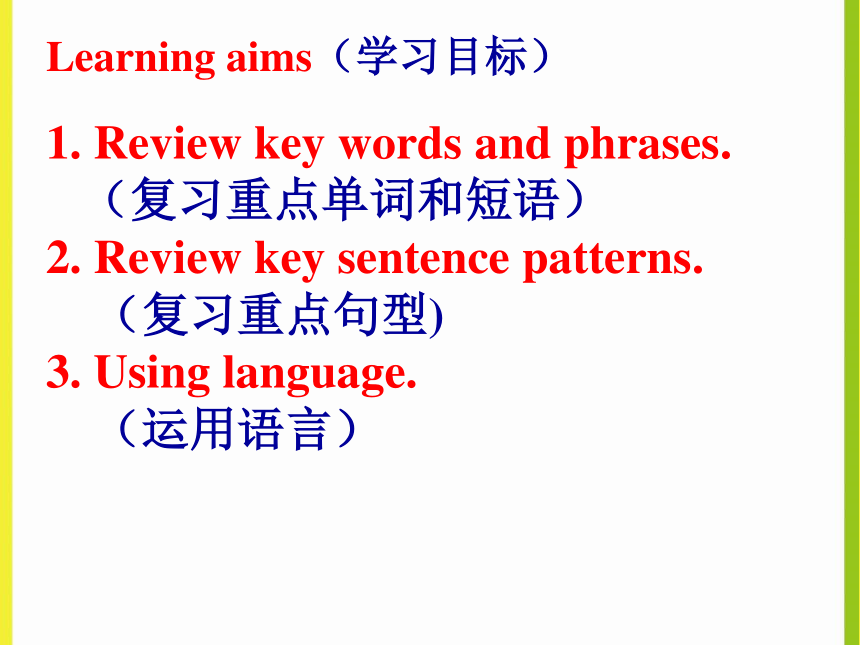

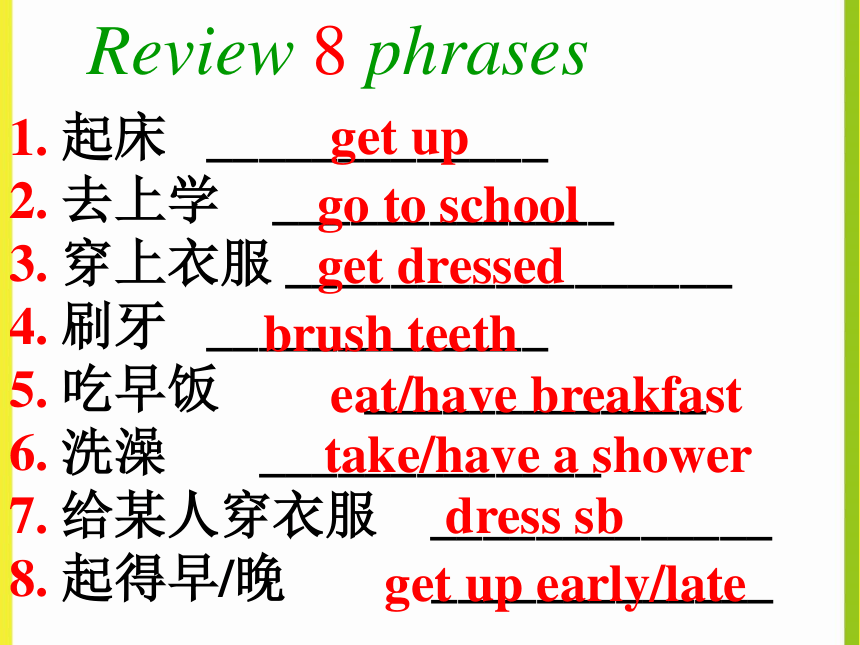
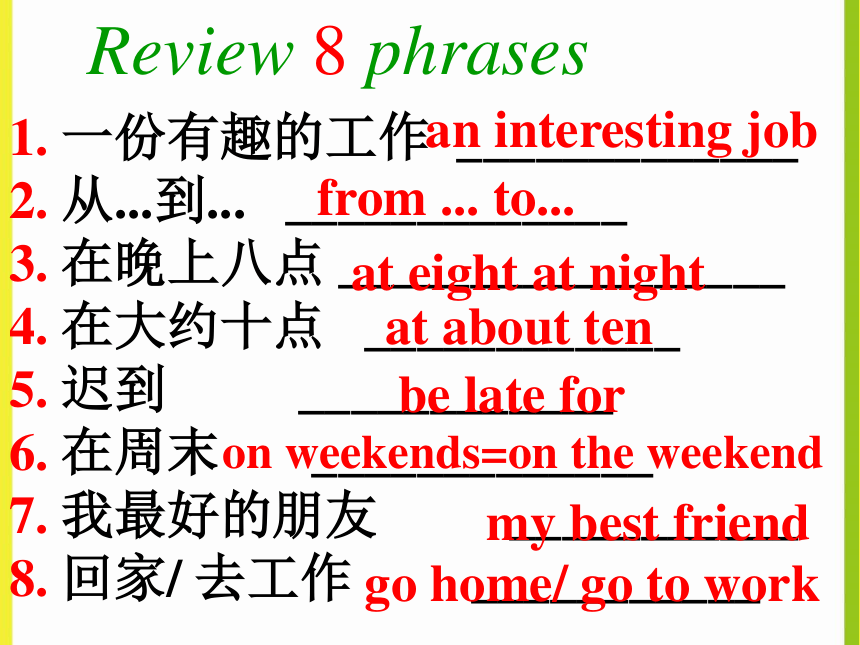

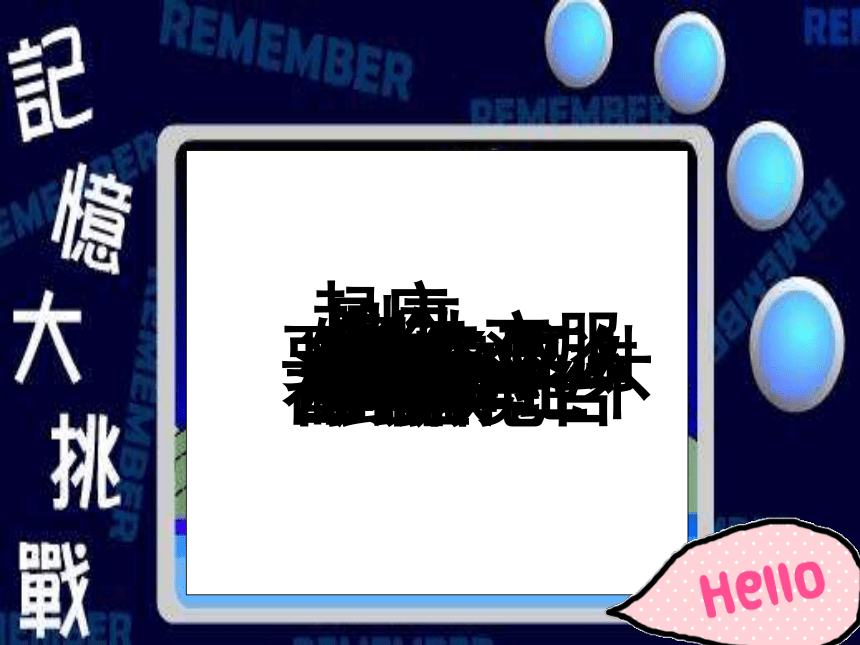

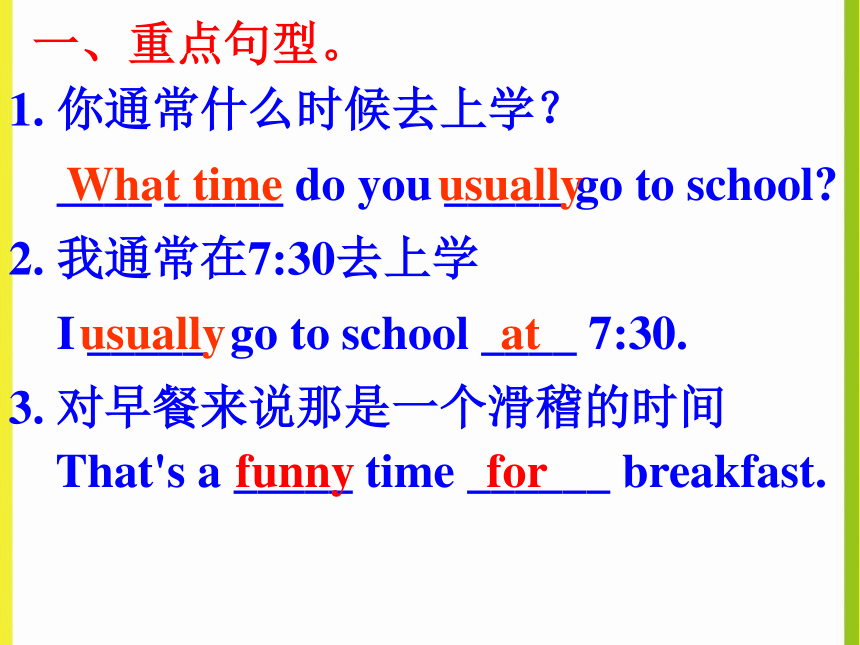
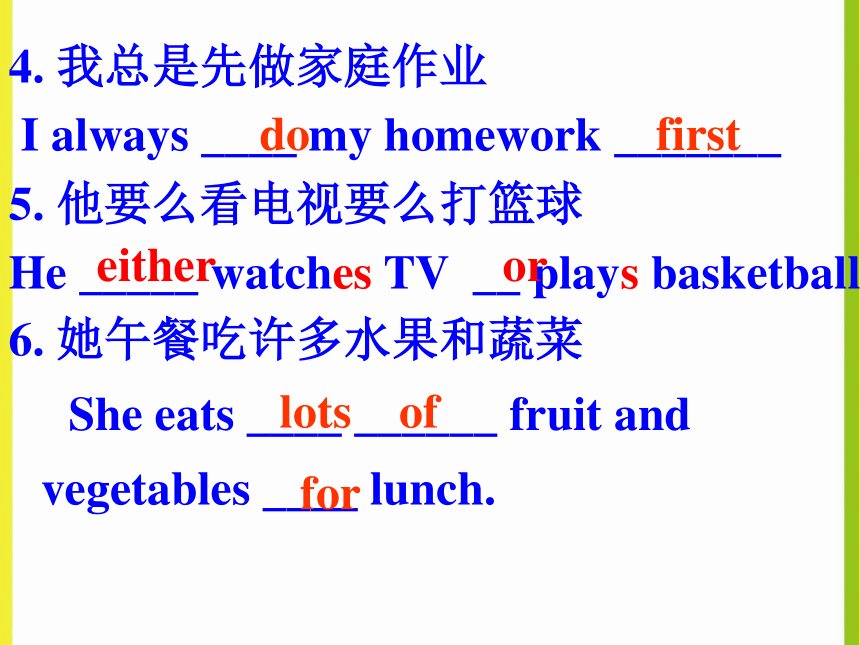
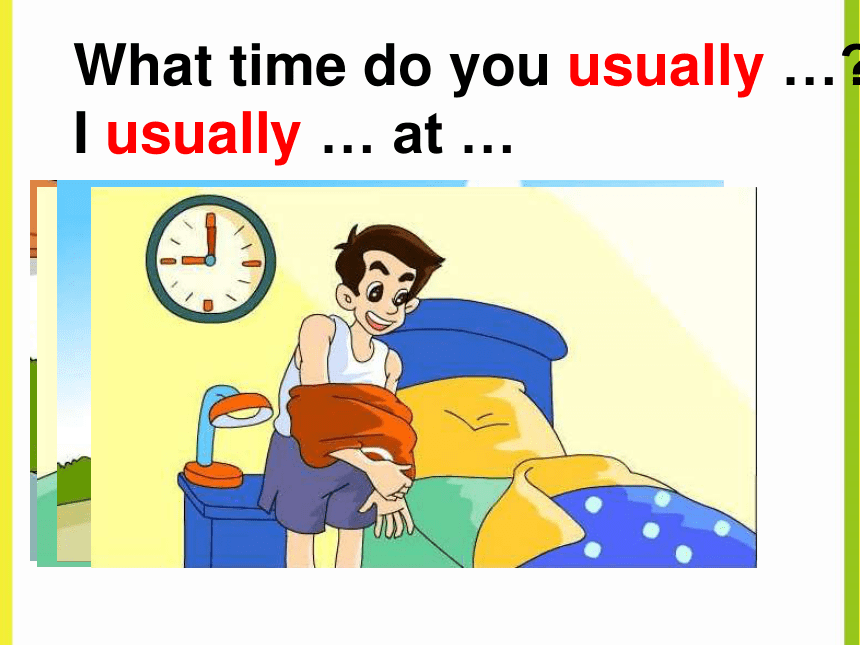
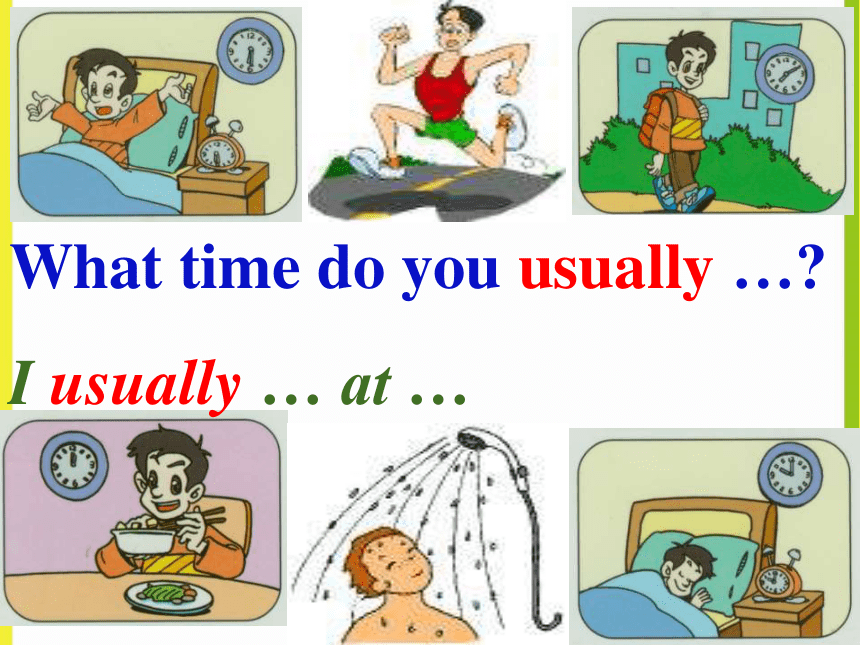
文档简介
(共41张PPT)
Review
1. Review key words and phrases.
(复习重点单词和短语)
2. Review key sentence patterns.
(复习重点句型)
3. Using language.
(运用语言)
Learning aims(学习目标)
Review
words and phrases.
复习单词和短语
1. 起床 _____________
2. 去上学 _____________
3. 穿上衣服 _________________
4. 刷牙 _____________
5. 吃早饭 _____________
6. 洗澡 _____________
7. 给某人穿衣服 _____________
8. 起得早/晚 _____________
Review 8 phrases
get up
go to school
get dressed
brush teeth
eat/have breakfast
take/have a shower
dress sb
get up early/late
1. 一份有趣的工作 _____________
2. 从...到... _____________
3. 在晚上八点 _________________
4. 在大约十点 ____________
5. 迟到 ____________
6. 在周末 _____________
7. 我最好的朋友 ___________
8. 回家/ 去工作 ___________
Review 8 phrases
an interesting job
from ... to...
at eight at night
at about ten
be late for
on weekends=on the weekend
my best friend
go home/ go to work
1. (持续)半小时 _____________
2. 在那之后 _____________
3. 从学校到家 _________________
4. 过一个健康生活 _____________
5. 做早操 _____________
6. 做大量运动 _____________
7. 要么...要么... ____________
8. 吃一顿大餐 ____________
Review 8 phrases
for half an hour
after that
get home from school
have a healthy life
do morning exercises
do much exercise
either...or...
eat a big dinner
起床
刷牙
穿上衣服
到达
要么…要么
为…感谢
许多
做作业
洗淋浴
练习
从不,绝不
做作业
4:15
大量
散步
品尝
9:30
广播电台
有时候
11:48
生活
去睡觉
品尝
在晚上
迟到
Review
key sentence patterns.
复习重点句型
1. 你通常什么时候去上学?
____ _____ do you _____ go to school?
2. 我通常在7:30去上学
I _____ go to school ____ 7:30.
3. 对早餐来说那是一个滑稽的时间
That's a _____ time ______ breakfast.
What time usually
usually at
一、重点句型。
funny for
4. 我总是先做家庭作业
I always ____ my homework _______
5. 他要么看电视要么打篮球
He _____ watches TV __ plays basketball.
6. 她午餐吃许多水果和蔬菜
She eats ____ ______ fruit and vegetables ____ lunch.
lots of
for
do first
either or
What time do you usually …?
I usually … at …
What time do you usually …?
I usually … at …
What time _____ she eat breakfast?
She ____ breakfast at 6:20.
___ ___ does she do her homework?
She ______ her _______ at 7:00.
1、顺读法:“钟点+分钟”
按时、分的顺序用数字直接表示整点数字后加上o'clock.
4:00 four o’clock
7点15分 seven fifteen
6:40 six forty
时间的表达法
2、分钟+past+小时 “几点过几分”(1—30分钟)
12:05 five past twelve
8:25 twenty-five past eight
11:10 ten past eleven
3、分钟+to+小时 “差几分几点”
(当分钟大于30时,用to表示“差几分钟到下一个钟点”。to是“差”的意思。)(31---59分钟)
10:50 ten to eleven
6:58 two to seven
9:40 twenty to ten
15或45分钟:a/one quarter
半小时用:half
7:45 a quarter to eight
10:15 a quarter past ten
3:30 half past three
在几点用 (介词)
at
6:25
6:40
7:00
4:05
7:15
9:30
half past nine
5 past 4
20 to 7
25 past 6
15 past 7
7 o’clock
1、上午七点整 2、中午十二点
3、早上五点半 4、下午五点一刻
5、差十分六点 6、五点过两分
7、三点二十五 8、四点三十八分
9、十二点差一刻 10、五点零五分
11、九点十分 12、十一点零六分
at + {
on
in
介词+time
at ten thirty / at nine o’clock
at night
October 1st a cold morning
Weekends Saturday
Monday evening
the morning
the afternoon
the evening
月份July…
年份2013
From…to…
from 8:00am to 8:00pm
from Monday to Friday
AM.
In the morning
1. get up ; get dressed
brush my teeth; wash my face
2. eat breakfast / have breakfast
do sports
go to school-----walk to school
take a bus to school
ride a bike to school
3. have four classes -----math ,English, Chinese…
At noon
have lunch
read books
do homework
PM
in the afternoon
have classes ------have a science class
2.psports -------play basketball…
3. go home ------- walk home…
in the evening
have dinner
2.ha rest(休息) -------watch TV
listen to music
3. do homework
At night
1. take a shower
2. Go to bed
4. clean the room
当主语是第三人称单数时,动词形式需作下列几种变化:
规则 动词原形 单三形式
一般动词在词尾加-s,
在清辅音后读/s/,
在浊辅音或元音后/z/;
在t后读/ts/,
在d后读/dz/。 help
swim
play
get
ride helps /helps/
swims /swimz/
plays /pleiz/
gets /gets/
rides /raidz/
以字母s, x, ch, sh结尾的动词加 –es,读/iz/。如果动词原形词尾已有e。则加s;以o结尾的动词也加es,读/z/。 watch
brush
go
do watches /iz/
brushes /iz/
goes /`g?uz/
does
以辅音字母加y结尾的动词,y变i,在加es,读/z/。 study studies /`stΛdiz/
写出下列动词的第三人称单数:
1.find 2.go 3.think 4. learn
5. Join 6.dance 7.swim 8.sing
9.paint 10.speak 11.be 12.show
13.draw 14.get 15.take 16.work
17.brush 18.love 19.listen 20.start
写出下列动词的第三人称单数:
21.write 22.tell 23. ask 24.sell
25.see 26.relax 27.have 28.buy
29.come 30.want 31.help 32.run
33.eat 34.like 35.play 36.let
37.bring 38.take 39.know 40.call
41.spell 42.look 43.wash 44.meet
45.sound
【考题链接】
Work: 1)work,动词,意为“工作,劳动”,第三单数是works;worker是名词,意为“工人”,复数是workers。
2)work 名词, 意为“工作”,是不可数名词.
job:可数名词,工作,职业;复数是 jobs.
用job, work填空。
1. Sally finds a new _____ and she goes to _______ at seven o’clock every day.
2. You can find a good ______ if(如果) you study hard now.
3. My father has lot of ________ to do, so he is busy.
job
job
work
work
2. She knows it’s not good for her, but it tastes good!
她知道这对她(健康)不好, 但它(指冰激凌)味道很美!
【自主领悟】(1)be good for. . . 表示“对……有益处; 对……有好处”; 其反义短语为be bad for. . . 表示“对……有害; 对……有坏处”。例如:
It’s good for our health to go to bed early and get up early. 早睡早起对我们的健康有好处。
【考题链接】
【归纳拓展】常见的其他感官类系动词
look看起来 sound听起来
smell闻起来 feel感觉起来
(2)taste在句中是系动词, 意为“有味道; 尝起来”后跟形容词作表语。例如:
The watermelon tastes sweet. 这西瓜尝起来很甜
【活学活用】
①The soup delicious. I’d like some more.
A. looks B. sounds C. tastes D. feels
②不要在暗处看书, 这对你的眼睛有害。
Don’t read in the dark. It’s your eyes.
③多吃水果对你的健康有好处。
Eating more fruit your health.
答案: ②bad for ③is good for
3. At twelve, she eats lots of fruit and vegetables for lunch. 在十二点, 她午餐吃大量的水果和蔬菜。
【自主领悟】lots of意为“许多的, 大量”, 还可以说成a lot of, 其后常接可数名词的复数或不可数名词。例如:
The man has lots of money. 这个人有很多钱。
I have lots of good friends in Beijing.
在北京我有许多好朋友。
【考题链接】
【温馨提示】a lot用作状语, 修饰动词.形容词或副词的比较级。
例如: Ann is a lot taller than Lucy.
安比露西高很多。
【活学活用】
①You give me help. Thanks .
A. a lot; lots of B. lots of; a lot
C. a lot; a lot D. lots of; lots of
②今天我感觉好多了。
I’m feeling better today.
答案: a lot
Unit 4 ┃ 易错点针对训练
┃易错点针对训练┃
Ⅰ.单项选择
( )1. --Either you or she ________ on duty today,
don't forget it.
--OK, I won't.
A.is B.am C.are D.be
( )2. --My parents ask me to finish my homework
______ after school.
--It's a good habit.
A.one B.first C.ones D.once
A
B
Ⅱ.用first, one, ones 或 once 填空
1. He is the ________ in the English test.
2. --Please have an apple.
--Thanks, I have ________.
3. These apples are green, and the red ________ are in the basket.
4. He cleans his car ________ a week.
Ⅲ.用所给词的适当形式填空
1. Either she or I _____ (be) busy this week.
Unit 2 ┃ 易错点针对训练
first
one
ones
once
am
2. Either you or he ________ (be) at work now.
3. There ________ (be) two books and a pen on the desk.
4. ________(arrive) at school on time, he gets up very early.
Unit 2 ┃ 易错点针对训练
is
are
To arrive
本单元以“日常作息习惯”为话题, 围绕这一话题巩固一般现在时的用法, 学习表达日常活动的词语以及时间表达法。因此本单元的书面表达常常是对日常学习.工作的描述。
写一封信给你的朋友告诉他你一天的生活。
Dear ________,
Thank you for your letter. I’d like to tell you something about my day.
In the morning,______________________
At noon,____________________________
In the afternoon,_____________________
In the evening,______________________
At night,___________________________
(On weekends,_____________________)
This is my day, busy but happy.
What about you? Please write and tell me about your life. Yours
Xiaoming
二、用所给单词的适当形式填空。
1. It is a very ________ (fun) story.
2. Jim _______ (brush) his teeth every day.
3. My parents usually ________ (exercise) on weekends.
4. Alice is one of my _____(good) friends.
5. There are five ______ (group) in our class.
单词填空,考查综合运用能力!
funny
brushes
exercise
best
groups
6. I usually eat breakfast very ________ (quick).
7. When she _____ (get) home, she always cooks first.
8. The food tastes _________ (well).
9. In the morning, she eats breakfast and _____ (go) to school.
10. It’s good for _____ (he).
单词填空,考查综合运用能力!
quickly
gets
good
goes
her
Review
1. Review key words and phrases.
(复习重点单词和短语)
2. Review key sentence patterns.
(复习重点句型)
3. Using language.
(运用语言)
Learning aims(学习目标)
Review
words and phrases.
复习单词和短语
1. 起床 _____________
2. 去上学 _____________
3. 穿上衣服 _________________
4. 刷牙 _____________
5. 吃早饭 _____________
6. 洗澡 _____________
7. 给某人穿衣服 _____________
8. 起得早/晚 _____________
Review 8 phrases
get up
go to school
get dressed
brush teeth
eat/have breakfast
take/have a shower
dress sb
get up early/late
1. 一份有趣的工作 _____________
2. 从...到... _____________
3. 在晚上八点 _________________
4. 在大约十点 ____________
5. 迟到 ____________
6. 在周末 _____________
7. 我最好的朋友 ___________
8. 回家/ 去工作 ___________
Review 8 phrases
an interesting job
from ... to...
at eight at night
at about ten
be late for
on weekends=on the weekend
my best friend
go home/ go to work
1. (持续)半小时 _____________
2. 在那之后 _____________
3. 从学校到家 _________________
4. 过一个健康生活 _____________
5. 做早操 _____________
6. 做大量运动 _____________
7. 要么...要么... ____________
8. 吃一顿大餐 ____________
Review 8 phrases
for half an hour
after that
get home from school
have a healthy life
do morning exercises
do much exercise
either...or...
eat a big dinner
起床
刷牙
穿上衣服
到达
要么…要么
为…感谢
许多
做作业
洗淋浴
练习
从不,绝不
做作业
4:15
大量
散步
品尝
9:30
广播电台
有时候
11:48
生活
去睡觉
品尝
在晚上
迟到
Review
key sentence patterns.
复习重点句型
1. 你通常什么时候去上学?
____ _____ do you _____ go to school?
2. 我通常在7:30去上学
I _____ go to school ____ 7:30.
3. 对早餐来说那是一个滑稽的时间
That's a _____ time ______ breakfast.
What time usually
usually at
一、重点句型。
funny for
4. 我总是先做家庭作业
I always ____ my homework _______
5. 他要么看电视要么打篮球
He _____ watches TV __ plays basketball.
6. 她午餐吃许多水果和蔬菜
She eats ____ ______ fruit and vegetables ____ lunch.
lots of
for
do first
either or
What time do you usually …?
I usually … at …
What time do you usually …?
I usually … at …
What time _____ she eat breakfast?
She ____ breakfast at 6:20.
___ ___ does she do her homework?
She ______ her _______ at 7:00.
1、顺读法:“钟点+分钟”
按时、分的顺序用数字直接表示整点数字后加上o'clock.
4:00 four o’clock
7点15分 seven fifteen
6:40 six forty
时间的表达法
2、分钟+past+小时 “几点过几分”(1—30分钟)
12:05 five past twelve
8:25 twenty-five past eight
11:10 ten past eleven
3、分钟+to+小时 “差几分几点”
(当分钟大于30时,用to表示“差几分钟到下一个钟点”。to是“差”的意思。)(31---59分钟)
10:50 ten to eleven
6:58 two to seven
9:40 twenty to ten
15或45分钟:a/one quarter
半小时用:half
7:45 a quarter to eight
10:15 a quarter past ten
3:30 half past three
在几点用 (介词)
at
6:25
6:40
7:00
4:05
7:15
9:30
half past nine
5 past 4
20 to 7
25 past 6
15 past 7
7 o’clock
1、上午七点整 2、中午十二点
3、早上五点半 4、下午五点一刻
5、差十分六点 6、五点过两分
7、三点二十五 8、四点三十八分
9、十二点差一刻 10、五点零五分
11、九点十分 12、十一点零六分
at + {
on
in
介词+time
at ten thirty / at nine o’clock
at night
October 1st a cold morning
Weekends Saturday
Monday evening
the morning
the afternoon
the evening
月份July…
年份2013
From…to…
from 8:00am to 8:00pm
from Monday to Friday
AM.
In the morning
1. get up ; get dressed
brush my teeth; wash my face
2. eat breakfast / have breakfast
do sports
go to school-----walk to school
take a bus to school
ride a bike to school
3. have four classes -----math ,English, Chinese…
At noon
have lunch
read books
do homework
PM
in the afternoon
have classes ------have a science class
2.psports -------play basketball…
3. go home ------- walk home…
in the evening
have dinner
2.ha rest(休息) -------watch TV
listen to music
3. do homework
At night
1. take a shower
2. Go to bed
4. clean the room
当主语是第三人称单数时,动词形式需作下列几种变化:
规则 动词原形 单三形式
一般动词在词尾加-s,
在清辅音后读/s/,
在浊辅音或元音后/z/;
在t后读/ts/,
在d后读/dz/。 help
swim
play
get
ride helps /helps/
swims /swimz/
plays /pleiz/
gets /gets/
rides /raidz/
以字母s, x, ch, sh结尾的动词加 –es,读/iz/。如果动词原形词尾已有e。则加s;以o结尾的动词也加es,读/z/。 watch
brush
go
do watches /iz/
brushes /iz/
goes /`g?uz/
does
以辅音字母加y结尾的动词,y变i,在加es,读/z/。 study studies /`stΛdiz/
写出下列动词的第三人称单数:
1.find 2.go 3.think 4. learn
5. Join 6.dance 7.swim 8.sing
9.paint 10.speak 11.be 12.show
13.draw 14.get 15.take 16.work
17.brush 18.love 19.listen 20.start
写出下列动词的第三人称单数:
21.write 22.tell 23. ask 24.sell
25.see 26.relax 27.have 28.buy
29.come 30.want 31.help 32.run
33.eat 34.like 35.play 36.let
37.bring 38.take 39.know 40.call
41.spell 42.look 43.wash 44.meet
45.sound
【考题链接】
Work: 1)work,动词,意为“工作,劳动”,第三单数是works;worker是名词,意为“工人”,复数是workers。
2)work 名词, 意为“工作”,是不可数名词.
job:可数名词,工作,职业;复数是 jobs.
用job, work填空。
1. Sally finds a new _____ and she goes to _______ at seven o’clock every day.
2. You can find a good ______ if(如果) you study hard now.
3. My father has lot of ________ to do, so he is busy.
job
job
work
work
2. She knows it’s not good for her, but it tastes good!
她知道这对她(健康)不好, 但它(指冰激凌)味道很美!
【自主领悟】(1)be good for. . . 表示“对……有益处; 对……有好处”; 其反义短语为be bad for. . . 表示“对……有害; 对……有坏处”。例如:
It’s good for our health to go to bed early and get up early. 早睡早起对我们的健康有好处。
【考题链接】
【归纳拓展】常见的其他感官类系动词
look看起来 sound听起来
smell闻起来 feel感觉起来
(2)taste在句中是系动词, 意为“有味道; 尝起来”后跟形容词作表语。例如:
The watermelon tastes sweet. 这西瓜尝起来很甜
【活学活用】
①The soup delicious. I’d like some more.
A. looks B. sounds C. tastes D. feels
②不要在暗处看书, 这对你的眼睛有害。
Don’t read in the dark. It’s your eyes.
③多吃水果对你的健康有好处。
Eating more fruit your health.
答案: ②bad for ③is good for
3. At twelve, she eats lots of fruit and vegetables for lunch. 在十二点, 她午餐吃大量的水果和蔬菜。
【自主领悟】lots of意为“许多的, 大量”, 还可以说成a lot of, 其后常接可数名词的复数或不可数名词。例如:
The man has lots of money. 这个人有很多钱。
I have lots of good friends in Beijing.
在北京我有许多好朋友。
【考题链接】
【温馨提示】a lot用作状语, 修饰动词.形容词或副词的比较级。
例如: Ann is a lot taller than Lucy.
安比露西高很多。
【活学活用】
①You give me help. Thanks .
A. a lot; lots of B. lots of; a lot
C. a lot; a lot D. lots of; lots of
②今天我感觉好多了。
I’m feeling better today.
答案: a lot
Unit 4 ┃ 易错点针对训练
┃易错点针对训练┃
Ⅰ.单项选择
( )1. --Either you or she ________ on duty today,
don't forget it.
--OK, I won't.
A.is B.am C.are D.be
( )2. --My parents ask me to finish my homework
______ after school.
--It's a good habit.
A.one B.first C.ones D.once
A
B
Ⅱ.用first, one, ones 或 once 填空
1. He is the ________ in the English test.
2. --Please have an apple.
--Thanks, I have ________.
3. These apples are green, and the red ________ are in the basket.
4. He cleans his car ________ a week.
Ⅲ.用所给词的适当形式填空
1. Either she or I _____ (be) busy this week.
Unit 2 ┃ 易错点针对训练
first
one
ones
once
am
2. Either you or he ________ (be) at work now.
3. There ________ (be) two books and a pen on the desk.
4. ________(arrive) at school on time, he gets up very early.
Unit 2 ┃ 易错点针对训练
is
are
To arrive
本单元以“日常作息习惯”为话题, 围绕这一话题巩固一般现在时的用法, 学习表达日常活动的词语以及时间表达法。因此本单元的书面表达常常是对日常学习.工作的描述。
写一封信给你的朋友告诉他你一天的生活。
Dear ________,
Thank you for your letter. I’d like to tell you something about my day.
In the morning,______________________
At noon,____________________________
In the afternoon,_____________________
In the evening,______________________
At night,___________________________
(On weekends,_____________________)
This is my day, busy but happy.
What about you? Please write and tell me about your life. Yours
Xiaoming
二、用所给单词的适当形式填空。
1. It is a very ________ (fun) story.
2. Jim _______ (brush) his teeth every day.
3. My parents usually ________ (exercise) on weekends.
4. Alice is one of my _____(good) friends.
5. There are five ______ (group) in our class.
单词填空,考查综合运用能力!
funny
brushes
exercise
best
groups
6. I usually eat breakfast very ________ (quick).
7. When she _____ (get) home, she always cooks first.
8. The food tastes _________ (well).
9. In the morning, she eats breakfast and _____ (go) to school.
10. It’s good for _____ (he).
单词填空,考查综合运用能力!
quickly
gets
good
goes
her
同课章节目录
- Unit 1 When is your birthday?
- Section A
- Section B
- Unit 2 My favourite subject is science
- Section A
- Section B
- Unit 3 Can you play the guitar?
- Section A
- Section B
- Unit 4 What time do you go to school?
- Section A
- Section B
- Unit 5 How do you get to school?
- Section A
- Section B
- Unit 6 Don't eat in class.
- Section A
- Section B
- Unit 7 Why do you like pandas?
- Section A
- Section B
- Unit 8 I'm watching TV.
- Section A
- Section B
- Unit 9 It's raining!
- Section A
- Section B
- Unit 10 Is there a post office near here?
- Section A
- Section B
